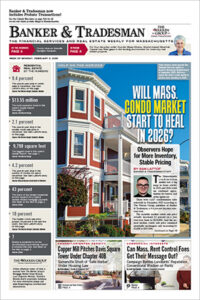
Just 720 single-families and 717 condominiums changed hands in the urban core and tony western parts of the Boston metro area in April. iStock illustration
Dismal, with a side order of jittery buyers.
That would be one way to describe spring real estate market as it limps towards an inglorious finish.
Traditionally a buoyant time of higher sales activity and jam-packed open houses, there were hopes heading into this spring of at least a modest improvement and maybe even more in the volume of sales.
The waning days of 2024 created flickers of optimism that the next year would be a slightly more normal housing market, with more inventory for buyers and fewer sellers sitting on the sidelines, locked into their low-rate mortgages.
It was not to be.
Closed home sales in the Boston area hit one of their lowest points in more than two decades this April, generally reflecting bids made on homes in March, as the first green tendrils of the spring housing market poked above ground.
What Happened? What Didn’t!
Just 720 single-families and 717 condominiums changed hands in the urban core and western parts of the Boston metro area in April, according to the Greater Boston Association of Realtors, representing a 6 percent decline from the same month last year.
Banker & Tradesman publisher The Warren Group, which looks at a wider set of towns and suburbs encompassing most of the area within the Interstate 495 belt, reported a 1.1 percent decline in sales.
By comparison, the only Aprils with fewer single-family sales in GBAR’s territory were in 2023, during the interest-rate shock, and in 2009 amid the Great Recession.
Housing affordability also took another hit, with the median Boston-area single-family sale price in April hitting a record $800,000 and the median condo sale price hitting $629,000, per The Warren Group.
So, what happened?
The question really isn’t what happened, but what didn’t?
Interest rates rose instead of falling as expected, making it even more expensive to buy a home, which, given how high home prices are right now in the Boston area, is no small matter.
But maybe even as consequential is the government-induced economic turmoil that has been a prominent feature of the second Trump presidency.
The tariff threats that tanked the stock and bond markets have receded somewhat, but the nation-leading cuts to scientific and health grants at Harvard, MIT and other huge research powerhouses that help fuel Greater Boston’s knowledge-based economy are very real.
More than one university has instituted a hiring freeze, while the outlook for the life sciences sector locally is uncertain.
Worried Buyers and Sellers
And it wouldn’t be a huge leap to assume that some of that uncertainty has filtered down to street level, making everyone a bit gun-shy right now.
“The best word to describe the market is ‘JITTERY,’” Sam Schneiderman, principal broker of the Greater Boston Home Team, said in an email. “Jittery buyers and jittery sellers. Oh… and jittery agents that may not have experienced a market like the current market.”
The effect may be broader than that, too. Massachusetts Association of Realtors data shows April single-family inventory – the number of homes on the market for sale – showed definite softness in the Pioneer Valley and Fall River areas even as it rose in many other places.
Still, there was one bright spot: The number of combined active single-family and condominium listings rose to 7,208 across the five-county Greater Boston region for the four weeks between March 31 and April 27, according to MLS data compiled by Redfin. That’s a 17.2 percent increase from April 2024.
Statewide, single-family inventory is up 8.5 percent while condo inventory is up 15.8 percent, according to MAR.

Scott Van Voorhis
Slow Sales, Meet Slow Construction
That said, it’s just a drop in the bucket given all the year – really, decades – of underbuilding, both in the Boston area and across the state.
And that’s poised to get worse, with homebuilders having joined many homebuyers on the sidelines as they grapple with high labor costs, continued high interest rates and the potential impact of tariffs on construction materials.
The numbers say it all, with developers having broken ground on just 2,626 new houses, apartments and condos across Massachusetts through the first three months of 2025, according to federal building permit numbers.
That’s markedly down from the same period last year, when permits were issued for 4,243 new homes despite modestly higher interest rates on construction loans.
All of which does not bode well for buyers or for any hope of reining in sale prices that galloped upwards in the last few years.
Scott Van Voorhis is Banker & Tradesman’s columnist and publisher of the Contrarian Boston newsletter; opinions expressed are his own. He may be reached at sbvanvoorhis@hotmail.com.






